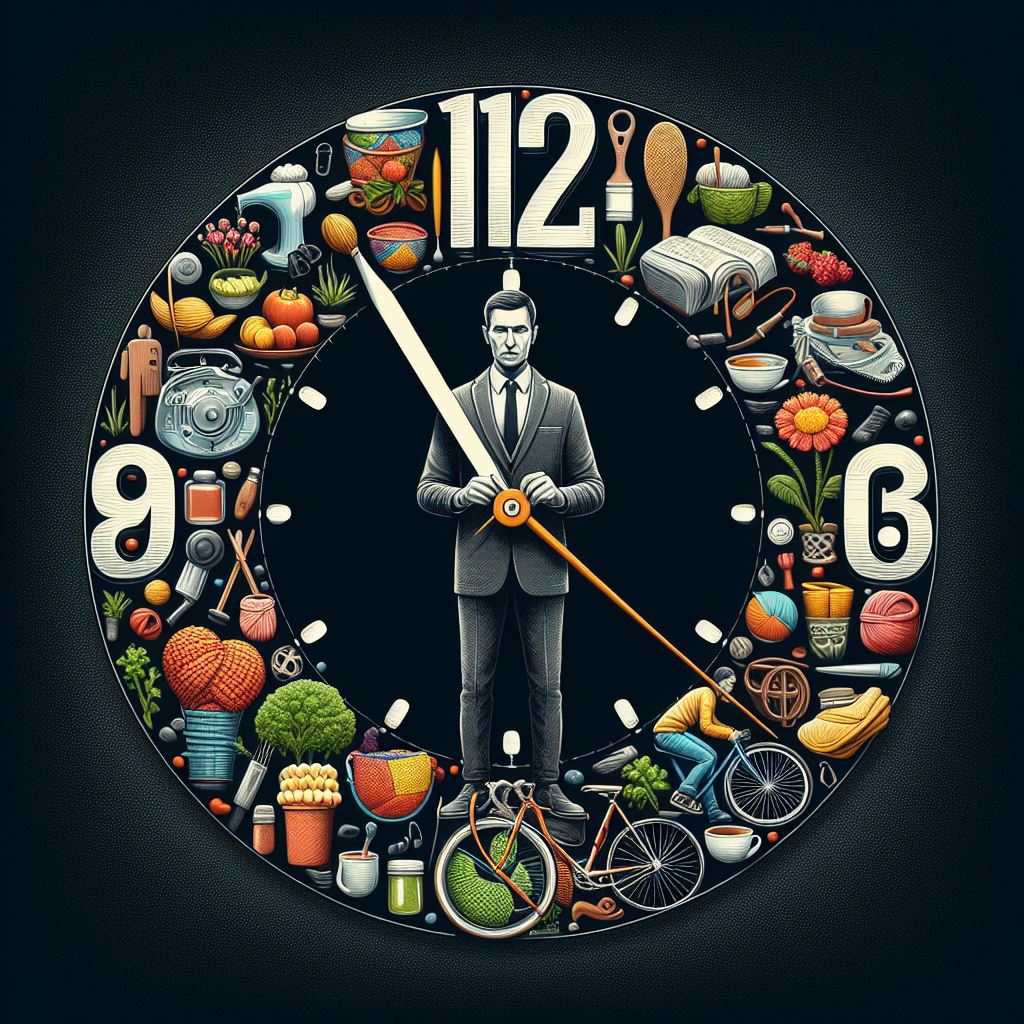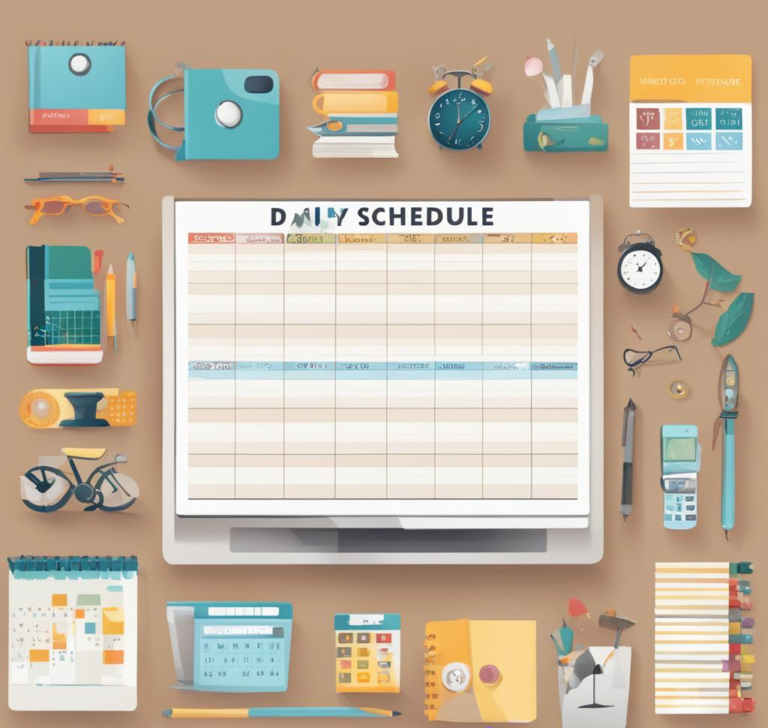The Role of Hobbies in Time Management: Balancing Work and Passion
Introduction
In the hustle and bustle of modern life, where time seems to slip through our fingers like elusive sand, many of us find ourselves in a perpetual juggling act. Picture this: a dedicated professional immersed in the demands of work, a diligent student navigating a sea of assignments, or a busy parent tirelessly attending to the needs of their family. The struggle with time management is a universal experience, leaving individuals yearning for a magic solution to create more hours in the day.
Enter the unexplored terrain of hobbies – those delightful pursuits often left on the sidelines as we navigate our daily responsibilities. What if we told you that the key to unlocking a more harmonious relationship with time lies in embracing your passions? In this journey, we’ll delve into the profound impact of integrating hobbies into the fabric of our routines, not merely as leisurely pursuits but as powerful tools for enhanced time management and overall well-being. Join us as we uncover the art of balancing work and passion, exploring how hobbies can transform the chaotic symphony of our lives into a harmonious melody of fulfillment.

The Benefits of Hobbies
Dive into the world of hobbies, and you’ll quickly realize that their influence extends far beyond mere enjoyment. Engaging in hobbies is akin to providing your mind and soul with a breath of fresh air amid the daily grind. The benefits are not just anecdotal; they’re supported by a wealth of research highlighting the profound impact of leisurely pursuits on mental health and overall well-being.
Imagine a hectic workweek punctuated by deadlines and meetings, and then picture yourself immersed in a creative pursuit or a favorite pastime over the weekend. The contrast is stark, and science backs it up. Numerous studies have shown that hobbies play a pivotal role in stress reduction, providing a therapeutic escape from the pressures of daily life. This stress relief, in turn, creates a positive ripple effect on mental health, fostering a more resilient and focused mind.
But the perks don’t stop there. Contrary to the belief that hobbies are mere distractions, evidence suggests that they can significantly boost productivity. When you indulge in activities you are passionate about, the mind enters a state of flow – a mental state where you are fully immersed and energized by the task at hand. Harnessing this flow extends beyond the confines of your hobby; it spills over into your professional and personal life, enhancing focus and overall productivity. So, let’s unravel the layers of these benefits, exploring how hobbies can be the secret sauce to a more balanced and fulfilled life.
Identifying Your Passion
Embarking on the journey of integrating hobbies into your life begins with the exciting task of identifying your passions. Think of it as a treasure hunt for activities that resonate with your heart and soul. The key here is authenticity – choosing hobbies that genuinely spark joy and fulfillment.
Start by reflecting on what activities make your heart skip a beat. What pursuits leave you feeling invigorated and truly alive? Consider the things you enjoyed as a child or aspects of your day that bring a smile to your face. These could be artistic endeavors, physical activities, intellectual pursuits, or even social engagements.
As you ponder these questions, don’t get bogged down by what others might think or what seems trendy. The goal is to connect with activities that resonate with you personally. It could be something as simple as gardening, painting, playing an instrument, or engaging in a sport. The spectrum of hobbies is vast, so don’t limit yourself. The essence of this exploration is to uncover activities that align with your passions and values.
Choosing hobbies authentically tied to your interests ensures a sustainable commitment. Unlike fleeting trends, genuine passions have a lasting impact on your well-being. So, let the journey of self-discovery commence, and may it lead you to hobbies that not only fill your leisure time but also enrich your life with purpose and joy.
Time Management Through Hobbies
As you delve into the world of hobbies, the natural question arises: How can these passions coexist with a busy schedule, especially for those juggling numerous responsibilities? Fear not, for integrating hobbies into your life is not just feasible but can also be a game-changer in effective time management.
One strategy is to treat your hobbies with the same priority as other commitments. Schedule dedicated time for your chosen activities, much like you would for work meetings or family gatherings. By allocating specific slots in your calendar, you signal the importance of these moments for your well-being.
Additionally, consider the concept of “micro-hobbies” – bite-sized activities that fit seamlessly into short breaks during your day. These can be as brief as a 10-minute sketching session, a quick musical interlude, or a brief stroll in nature. Such micro-hobbies serve as rejuvenating pauses amid a hectic day, providing mental refreshment without demanding a substantial time investment.
Remember, the goal is not to add more stress by turning your hobbies into obligations. Instead, view them as essential components of your routine that contribute positively to your overall productivity and happiness. By adopting these strategies, you not only make room for your passions but also discover the transformative potential of weaving hobbies into the fabric of your busy life.

Leisure Time as a Productivity Booster
Leisure time is often misunderstood as a mere luxury, a guilty pleasure to be enjoyed sparingly. However, when we look closer, we find that incorporating leisure, particularly through hobbies, can be a powerful catalyst for productivity.
Engaging in hobbies during leisure moments serves as a mental reset button. It allows your mind to temporarily disengage from work-related stressors, fostering a mental environment conducive to relaxation and creativity. This respite from the demands of daily life can prove invaluable in recharging your cognitive resources.
Consider hobbies as a form of active recovery for your brain. Just as athletes strategically integrate rest days into their training schedules, you, too, can benefit from deliberate breaks to engage in activities you love. Whether it’s painting, gardening, or playing a musical instrument, these pursuits serve as a bridge between leisure and increased productivity.
In essence, leisure time is not a detour from productivity but a pit stop that fine-tunes your mental engine. By investing moments in activities that bring joy and relaxation, you’re not only replenishing your energy but also creating a mental space where creativity and problem-solving can flourish. So, the next time you find yourself questioning the value of leisure, remember that it might just be the missing piece in your productivity puzzle.
Creating a Hobby-Friendly Schedule
Building a schedule that harmonizes work responsibilities with the pursuit of hobbies is akin to orchestrating a symphony where each note plays a crucial role. Here are some tips to help you compose a melody of productivity and passion:
- Prioritize Hobbies: Treat your hobbies with the same level of importance as work commitments. Block dedicated time slots for your chosen activities, just as you would for meetings or deadlines.
- Embrace Micro-Moments: Recognize that you don’t need hours on end to enjoy your hobbies. Embrace micro-moments throughout the day—a sketch during your coffee break or a short jog before dinner. These snippets of time can add up to a fulfilling hobby experience.
- Create a Weekly Hobby Ritual: Designate a specific day or time each week exclusively for your hobbies. Consistency builds momentum, and having a designated hobby day adds structure to your schedule.
- Combine Leisure and Productivity: If possible, intertwine your hobbies with other activities. Listen to educational podcasts during your hobby-related commute or take a nature walk while practicing photography. This way, you’re infusing leisure into daily tasks.
- Flexible Planning: Life is unpredictable, and schedules often need adjustment. Be flexible in your planning to accommodate unforeseen events while ensuring your hobbies remain a priority.
- Involve Family and Friends: Turn your hobbies into social activities. Include your family or friends in your pursuits, fostering connections while indulging in your passions.
Remember, a well-crafted schedule is not about rigid constraints but about intentional design. By weaving hobbies into your daily or weekly routine, you’ll discover a harmonious balance between the demands of work and the joys of leisure.
Hobbies for Stress Relief
In the chaotic symphony of life, introducing stress-relieving hobbies is akin to playing a calming melody that soothes the soul. Consider incorporating these hobbies into your repertoire for a harmonious escape from life’s cacophony:
- Mindful Meditation: Delve into the world of mindfulness through meditation. Whether it’s a few minutes of deep breathing or guided meditation sessions, this hobby provides a sanctuary of tranquility.
- Gardening Therapy: Tending to a garden offers not only a visual feast but also a therapeutic escape. The act of planting, nurturing, and witnessing the growth of greenery has a serene, stress-relieving effect.
- Artistic Expression: Embrace the world of art through painting, drawing, or sculpting. Channel your emotions onto a canvas, allowing the creative process to act as a cathartic release.
- Reading as Escape: Immerse yourself in the realms of fiction. A good book has the power to transport you to different worlds, providing a mental break from everyday stresses.
- Music and Melody: Whether playing an instrument or simply listening to music, the rhythm and melody can be a powerful stress buster. Lose yourself in the harmonies that resonate with your soul.
- Yoga Serenity: Combining physical activity with mental peace, yoga is a holistic approach to stress relief. The gentle stretches and focused breathing create a serene atmosphere.
- Cooking Adventures: Turn your kitchen into a haven of culinary exploration. Experiment with new recipes and savor the joy of creating delightful dishes—culinary therapy at its finest.
- Nature Walks: Connect with nature through leisurely walks. The outdoors, with its fresh air and natural beauty, acts as a soothing backdrop for contemplation and relaxation.
By introducing these stress-relieving hobbies into your routine, you’ll discover a symphony of calmness amidst life’s bustling tempo. Each hobby is a unique instrument, playing a part in creating a composition that resonates with serenity and well-being.
Socializing Through Hobbies
Engaging in hobbies is not just a solitary pursuit; it can also be a vibrant avenue for social connections, creating a tapestry of shared experiences and lasting relationships. Here are some hobbies that come with a delightful social component:
- Group Fitness Classes: Joining fitness classes or sports clubs introduces a communal aspect to physical activities. Whether it’s a dance class or a team sport, the camaraderie fosters a sense of belonging.
- Book Clubs: For avid readers, book clubs provide an opportunity to share thoughts, insights, and a good laugh over a cup of coffee. It’s a tapestry of literary minds connecting through the pages of a book.
- Art Workshops: Attend art classes or workshops to unleash your creative side in a social setting. The shared passion for art becomes the foundation for meaningful connections.
- Community Gardening: Cultivate not just plants but friendships in community gardens. Working together towards a common goal creates a shared tapestry of growth and nurturance.
- Cooking Classes: Culinary adventures are more enjoyable when shared. Joining cooking classes not only enhances your kitchen skills but also provides a delightful space to connect with fellow food enthusiasts.
- Language Exchange Meetups: Learning a new language becomes a social affair in language exchange meetups. The shared endeavor to master a language weaves a tapestry of cultural exchange and camaraderie.
- Board Game Nights: Transforming leisure into friendly competition, board game nights offer an entertaining way to socialize. The shared laughter and strategic gameplay create a memorable tapestry of fun.
- Volunteering Together: Contributing to a cause you care about while socializing amplifies the impact. Volunteering becomes a shared endeavor, weaving a tapestry of compassion and shared values.
By choosing hobbies with a social component, you not only indulge in your passions but also weave a rich tapestry of connections, turning your leisure time into a vibrant social symphony.

FAQs Section
1. How can I find time for hobbies in my busy schedule?
Finding time for hobbies requires prioritization. Allocate dedicated time slots in your schedule, even if they are short. Consider combining micro-hobbies with breaks during work to make it more manageable.
2. Are there hobbies suitable for parents with young children?
Absolutely! Look for hobbies that can involve your children or find activities that can be pursued during their nap times or after bedtime. Consider hobbies that align with family interests.
3. Can hobbies really boost productivity?
Yes, engaging in hobbies can enhance productivity. They provide mental breaks, reducing stress and refreshing your mind. This can lead to improved focus and efficiency when you return to work-related tasks.
4. What if my hobbies require specific equipment or space?
Adapt your hobbies to your available resources. Explore alternatives or find creative ways to modify your chosen activities. Many hobbies can be tailored to fit your circumstances.
5. How do I avoid feeling guilty for taking time for hobbies?
Recognize that leisure time, including hobbies, is essential for overall well-being. Overcoming guilt involves understanding that taking care of yourself positively impacts your ability to care for others and perform well in your responsibilities.
6. Can social hobbies be pursued online?
Absolutely! Many social hobbies, such as book clubs, language exchange, and even fitness classes, have online counterparts. Embrace the digital world to connect with like-minded individuals globally.
7. Should I stick to one hobby or try multiple activities?
It depends on your preferences. Some individuals enjoy deepening their expertise in one hobby, while others thrive on variety. Experiment with different activities to discover what brings you the most joy.
8. How do I overcome perfectionism in my hobbies?
Remember that hobbies are meant to be enjoyable, not perfect. Embrace the learning process, and don’t let the quest for perfection hinder your enjoyment. Celebrate progress rather than focusing on perfection.
Conclusion
In conclusion, integrating hobbies into your routine is more than a leisurely pursuit—it’s a strategic move for enhanced well-being and time management. The benefits of hobbies extend beyond mere enjoyment, positively impacting mental health, stress levels, and overall productivity. By identifying and prioritizing your passions, you unlock a powerful tool to recharge and refocus, ultimately leading to a more fulfilling and balanced life. Remember, time spent on activities you love is an investment in your overall happiness. So, take that step, rediscover your interests, and embrace the transformative power of hobbies in your daily life. Your well-being and productivity will thank you.






